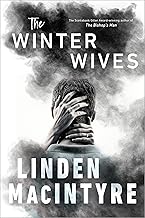3.5 Stars
Lifelong friends since university, Byron and Allan are enjoying a game of golf when Allan has a stroke. Faced with his mortality, Allan decides he needs to make some decisions concerning his extensive business empire. He enlists the help of his wife, Peggy Winter; her sister and Byron’s wife, Annie Winter, who has served as his accountant; and Byron who has been his lawyer for many of his deals. At the same time, Byron is worried about showing the early signs of dementia which claimed his mother.
Byron, the narrator, admits that he and Allan are a “strange pair. Two guys who didn’t have a thing in common.” Their friendship seems unlikely. Allan is the wheeler-dealer who lives in Toronto. Byron tells his wife that, ‘’Allan is my oldest friend. I’d trust him with my life. But Allan is a criminal.” Byron, meanwhile, is a lawyer reluctant to move from his family homestead in rural Nova Scotia. Because of a traumatic childhood injury, he has been left with a limp and a faulty memory.
Neither Byron nor Allan is particularly likeable. Allan’s financial success has been built on drugs and money laundering; Byron is aware of his friend’s shady dealings and even facilitates them, though he keeps himself at a distance from day-to-day operations and chooses not to look too closely. Byron claims to have spent sleepless nights debating “the fine line between protecting and enabling,” before agreeing to work for Allan, but there is little evidence of an ethical struggle. He justifies his actions by arguing that “everything we do is compromised at some point. We survive by compromise, by moral flexibility." Then, any sympathy I felt for Byron is eradicated after an encounter between him and Peggy.
The book asks whether we can really know people: “Byron. Annie. Peggy. Allan. Always strangers to each other, always strangers to ourselves. Who are we?” Byron states, “People are inscrutable surfaces. They are social fabrications, concealing private lives that are unknowable.” Of course, some people make certain they are unknowable. Allan, for example, has a phobia about signing anything. He also used different names: “Allan had many names – inventions he could use when necessary then leave behind, as irrelevant as worn-out shoes. A name is a persona, he’d say, and a persona has no substance.” Peggy describes her husband as “a fiction, a creative enterprise that he’s been working on for decades.”
Byron thinks he knows Allan: “A name is only a name. Identity is something else, something deep and private, shared only with those who, over time, we come to trust. I took for granted that the list of people he trusted was very short. Me and Annie. And obviously, Peggy.” Byron tells Peggy that he knows “the Allan he’s always wanted me to know” but it becomes clear there is much he doesn’t know. A mystery in the novel is who Allan really is.
The book is being described as a thrilling psychological drama, but I didn’t find it especially thrilling. It is not fast paced enough to be a thrilling. I also did not find it to be as compelling a read as I had expected because I found it difficult to care about what happened to the characters. And the idea that people may not be what they seem is hardly original.
Note: I received a digital galley from the publisher via NetGalley.

I totally agree with your analysis ,,,this story fell flat for me ,,I was expecting much more from Linden Mcintyre ,having thoroughly enjoyed The Bishop,s Man .2stars from me, bev macdougall
ReplyDeleteThank you! I found the same - I read it was a psychological thriller and came to google to see if there was something I missed here - it's not thrilling at all. I find myself trudging through the book waiting for something to happen. 2 stars for me as well.
ReplyDelete